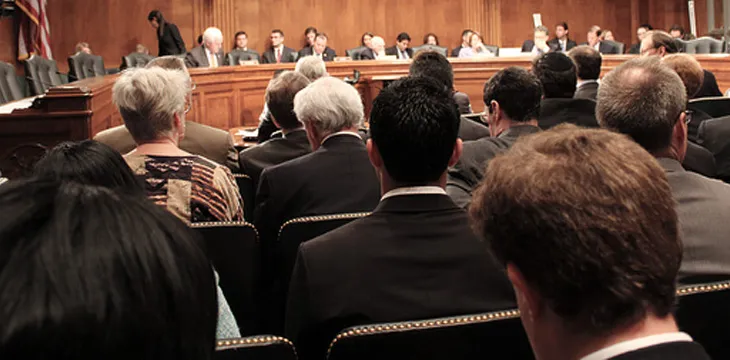|
Getting your Trinity Audio player ready...
|
The cryptocurrency space was the topic of a congressional hearing on March 14 where amongst topics discussed, there where potential capital formation, initial coin offerings (ICOs) and cryptocurrencies. This was the first hearing on this sensitive topic by a House Financial Services subcommittee and although the discussion was generally positive, there appeared to be negative sentiment overall as the market reacted badly to the outcome.
Witnesses at the hearing included Dr. Chris Brummer, professor of Law at Georgetown University Law Center; Mike Lempres, chief legal and risk officer at Coinbase; Robert Rosenblum, a partner at the Silicon Valley law firm Wilson Sonseni Goodrich & Rosati; and Peter Van Valkenburgh, director of research at Coin Center.
The main point of the hearing was the difference between the function of cryptocurrencies and the business of capital appreciation where ICOs can offer interesting opportunities to investors. There was also an extensive discussion on how state and federal regulators can administer laws in the crypto space where investors can be protected. Blockchain technology was another topic which came up and the positive effects of this technology were also discussed at length.
Distinguishing major cryptocurrencies from the majority of ICO tokens was the biggest topic during the hearing.Van Valkenburgh noted that digital scarcity is a fundamental difference between ICOs and cryptocurrencies such as Bitcoin, Ethereum and Filecoin.
A hot topic was the distinction between the major cryptocurrencies such as Bitcoin and Ethereum and other newer ones such as Filecoin. The Coin Center research director explained that the main feature for cryptocurrencies was their digital scarcity which could then be harnessed into a force for good—at least up to a point.
“A token that is scarce and transferable from person to person can be used just like money, just as any good throughout history from gold to seashells,” Van Valkenburgh told the committee, noting that Ethereum, Filecoin and Blockcstack “are beginning to compete with giants like Amazon, Facebook, and Google.
When looking at regulatory issues, there must be a clear distinction between tokens which are scarce and exist on a blockchain and those which are used to pay or obtain services as well as those which represent the efforts of a developer that may become profitable.
Meanwhile, Rosenblum suggested a long-term approach to the regulation of cryptocurrencies so that there will not be a concrete system of regulation too early in the sector’s infancy. He argued that both blockchain and artificial intelligence need time to grow before being completely stifled by unnecessary bureaucracy.
“It (Blockchain) could potentially lead to new marketing, business opportunities, scientific and sociological advances. However, the opportunity to use that same technology for manipulative conduct, data breach and other nefarious conduct is really hard to predict right now,” Rosenblum added.
There were differing opinions by congressmen on the usability and security of cryptocurrencies. California Rep. Brad Sherman was very direct and dissing about the industry, telling the committee that, “Cryptocurrencies are popular with guys who like to sit in their pajamas and tell their wives they are going to be millionaires. They help terrorists and criminals move money around the world. Tax evaders. They help startup companies commit fraud, take money, and one percent of the time they actually create a useful business.”
Rep. Tom Emmer, a member of the Congressional Blockchain Caucus, was more positive in his suggestion that the development of the technology was something that should garner bipartisan support, telling the committee that “there has to be some regulation, but there’s got to be balance.”

 07-12-2025
07-12-2025 





